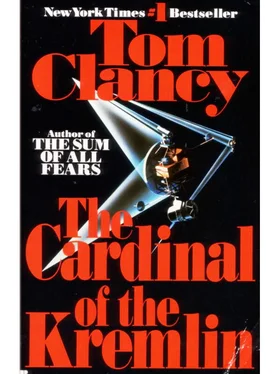Tom Clancy - The Cardinal of the Kremlin
Здесь есть возможность читать онлайн «Tom Clancy - The Cardinal of the Kremlin» весь текст электронной книги совершенно бесплатно (целиком полную версию без сокращений). В некоторых случаях можно слушать аудио, скачать через торрент в формате fb2 и присутствует краткое содержание. Год выпуска: 1988, Жанр: Триллер, на английском языке. Описание произведения, (предисловие) а так же отзывы посетителей доступны на портале библиотеки ЛибКат.
- Название:The Cardinal of the Kremlin
- Автор:
- Жанр:
- Год:1988
- ISBN:нет данных
- Рейтинг книги:3 / 5. Голосов: 1
-
Избранное:Добавить в избранное
- Отзывы:
-
Ваша оценка:
- 60
- 1
- 2
- 3
- 4
- 5
The Cardinal of the Kremlin: краткое содержание, описание и аннотация
Предлагаем к чтению аннотацию, описание, краткое содержание или предисловие (зависит от того, что написал сам автор книги «The Cardinal of the Kremlin»). Если вы не нашли необходимую информацию о книге — напишите в комментариях, мы постараемся отыскать её.
The Cardinal of the Kremlin — читать онлайн бесплатно полную книгу (весь текст) целиком
Ниже представлен текст книги, разбитый по страницам. Система сохранения места последней прочитанной страницы, позволяет с удобством читать онлайн бесплатно книгу «The Cardinal of the Kremlin», без необходимости каждый раз заново искать на чём Вы остановились. Поставьте закладку, и сможете в любой момент перейти на страницу, на которой закончили чтение.
Интервал:
Закладка:
"Right." Greer nodded, then smiled. "I know which one to ask for."
"As soon as we know which, I'll send our man to her. We'll use Mr. Clark," Ritter said. Heads nodded. Clark was a minor legend in the Operations Directorate. If anybody could do it, he could.
"Okay, get the message off to Foley," the Judge said. "I'll have to brief the President on this." He wasn't looking forward to that.
"Nobody lasts forever. CARDINAL's beat the odds three times over," Ritter said. "Make sure you tell him that, too."
"Yeah. Okay, gentlemen, let's get to it."
Admiral Greer went immediately to his office. It was just before seven, and he called the Pentagon, OP-02, the office of the Assistant Chief of Naval Operations (Undersea Warfare). After identifying himself, he asked his first question: "What's Dallas up to?"
Captain Mancuso was already at work, too. His last deployment on USS Dallas would begin in five hours. She'd sail on the tide. Aft, the engineers were already bringing the nuclear reactor on line. While his executive officer was running things, the Captain was going over the mission orders again. He was heading "up north" one last time. In the U.S. and Royal navies, up north meant the Barents Sea, the Soviet Navy's backyard. Once there, he'd conduct what the Navy officially termed oceanographic research , which in the case of USS Dallas meant that she'd spend all the time possible trailing Soviet missile submarines. It wasn't easy work, but Mancuso was an expert at it, and he had, in fact, once gotten a closer look at a Russian "boomer" than any other American sub skipper. He couldn't discuss that with anyone, of course, not even a fellow skipper. His second Distinguished Service Medal, awarded for that mission, was classified and he couldn't wear it; though its existence did show in the confidential section of his personnel file, the actual citation was missing. But that was behind him, and Mancuso was a man who always looked forward. If he had to make one final deployment, it might as well be up north. His phone rang.
"Captain speaking," he answered.
"Bart, Mike Williamson," said the Submarine Group Two commander. "I need you here, right now."
"On the way, sir." Mancuso hung up in surprise. Within a minute he was up the ladder, off the boat, and walking along the blacktopped quay in the Thames, where the Admiral's car was waiting. He was in the Group Two office four minutes after that.
"Change in orders," Rear Admiral Williamson announced as soon as the door was closed.
"What's up?"
"You're making a high-speed run for Faslane. Some people will be meeting you there. That's all I know, but the orders originated at OP-02 and came through SUBLANT in about thirty seconds." Williamson didn't have to say anything else. Something very hot was up. Hot ones came to Dallas quite often. Actually, they came to Mancuso, but then, he was Dallas .
"My sonar department's still a little thin," the Captain said. "I've got some good young ones, but my new chief's in the hospital. If this is going to be especially hairy…"
"What do you need?" Admiral Williamson asked, and got his answer.
"Okay, I'll get to work on that. You have five days to Scotland, and I can work something out on this end. Drive her hard, Bart."
"Aye aye, sir." He'd find out what was happening when he got to Faslane.
"How are you, Russian?" the Archer asked.
He was better. The previous two days, he'd been sure that he'd die. Now he wasn't so sure. False hope or not, it was something he hadn't had before. Churkin wondered now if there might really be a future in his life, and if it were something he might have to fear. Fear. He'd forgotten that. He'd faced death twice in a small expanse of time. Once in a falling, burning airplane, hitting the ground and seeing the instant when his life ended; then waking up from death to find an Afghan bandit over him with a knife, and seeing death yet again, only to have it stop and leave. Why? This bandit, the one with the strange eyes, both hard and soft, pitiless and compassionate, wanted him to live. Why? Churkin had the time and energy to ask the question now, but they didn't give him an answer.
He was riding in something. Churkin realized that he was lying on a steel deck. A truck? No, there was a flat surface overhead, and that, too, was steel. Where am I? It had to be dark outside. No light came through the gunports in the side of – he was in an armored personnel carrier! Where did the bandits get one of those? Where were they –
They were taking him to Pakistan! They would turn him over to… Americans? And hope changed yet again to despair. He coughed again, and fresh blood erupted from his mouth.
For his part, the Archer felt lucky. His group had met up with another, taking two Soviet BTR-60 infantry carriers out to Pakistan, and they were only too happy to carry the wounded of his band out with them. The Archer was famous, and it could not hurt to have a SAM-shooter protect them if Russian helicopters showed up. But there was little danger of that. The nights were long, the weather had turned foul, and they averaged almost fifteen kilometers per hour on the flat places, and no less than five on the rocky ones. They'd be to the border in an hour, and this segment was held by the mudjaheddin . The guerrillas were starting to relax. Soon they'd have a week of relative peace, and the Americans always paid handsomely for Soviet hardware. This one had night-vision devices that the driver was using to pick his way up the mountain road. For that they could expect rockets, mortar shells, a few machine guns, and medical supplies.
Things were going well for the mudjaheddin . There was talk that the Russians might actually withdraw. Their troops no longer craved close combat with the Afghans. Mainly the Russians used their infantry to achieve contact, then called in artillery and air support. Aside from a few vicious bands of paratroopers and the hated Spetznaz forces, the Afghans felt that they had achieved moral ascendancy on the battlefield – due, of course, to their holy cause. Some of their leaders actually talked about winning, and the talk had gotten to the individual fighters. They, too, now had hope of something other than continued holy war.
The two infantry carriers reached the border at midnight. From there the going was easier. The road down into Pakistan was now guarded by their own forces. The APC drivers were able to speed up and actually enjoy what they were doing. They reached Miram Shah three hours later. The Archer got out first, taking with him the Russian prisoner and his wounded.
He found Emilio Ortiz waiting for him with a can of apple juice. The man's eyes nearly bugged out when he realized that the man the Archer was carrying was a Russian.
"My friend, what have you brought me?"
"He is badly hurt, but here is what he is." The Archer handed over one of the man's shoulder boards, then a briefcase. "And this is what he was carrying."
"Son of a bitch!" Ortiz blurted in English. He saw the crusted blood around the man's mouth and realized that his medical condition was not promising, but… what a catch this was! It took another minute of following the wounded to the field hospital before the next question came to the case officer: What the hell do we do with him?
The medical team here, too, was composed mainly of Frenchmen, with a leavening of Italians and a few Swedes. Ortiz knew most of them, and suspected that many of them reported to the DGSE, the French foreign intelligence agency. What mattered, however, was that there were some pretty good doctors and nurses here. The Afghans knew that, too, and protected them as they might have protected the person of Allah. The surgeon who had triage duty put the Russian third on the operating schedule. A nurse medicated him, and the Archer left Abdul to keep an eye on things. He hadn't brought the Russian this far to have him killed. He and Ortiz went off to talk.
Читать дальшеИнтервал:
Закладка:
Похожие книги на «The Cardinal of the Kremlin»
Представляем Вашему вниманию похожие книги на «The Cardinal of the Kremlin» списком для выбора. Мы отобрали схожую по названию и смыслу литературу в надежде предоставить читателям больше вариантов отыскать новые, интересные, ещё непрочитанные произведения.
Обсуждение, отзывы о книге «The Cardinal of the Kremlin» и просто собственные мнения читателей. Оставьте ваши комментарии, напишите, что Вы думаете о произведении, его смысле или главных героях. Укажите что конкретно понравилось, а что нет, и почему Вы так считаете.






![Александр Ирвин - Tom Clancy’s The Division 2. Фальшивый рассвет [litres]](/books/417744/aleksandr-irvin-tom-clancy-s-the-division-2-falsh-thumb.webp)





